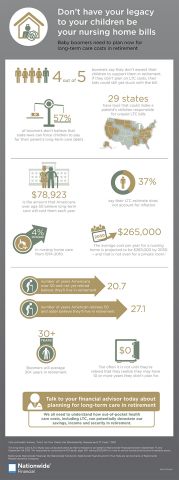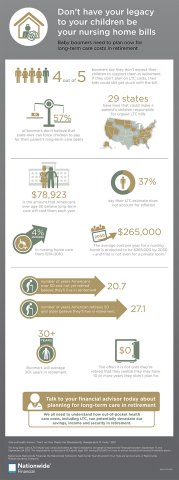COLUMBUS, Ohio--(BUSINESS WIRE)--A new Nationwide Financial consumer survey found that boomers’ beliefs on the cost of long-term care (LTC) and the time they will spend in retirement do not match reality. In fact, Americans aged 50 and older underestimate the annual costs of LTC by more than three times the actual cost.
According to the Harris Interactive poll released today, boomers expect their LTC costs to be $78,923 annually. However, nearly two in five respondents (37 percent) admit they failed to factor for inflation. The reality is by 2030 – the year the last of the baby boomers will retire – the cost of a nursing home is expected to reach $265,000 per year.1
Three in four (75 percent) of the 813 retired and non-retired Americans aged 50 or older with at least $150,000 in annual income or investable assets surveyed say that when they hear the term “long-term care” they think of nursing home care or residential assisted living. In actuality, nearly half of all LTC is performed by a professional within an individual’s home. A little over a quarter (27 percent) of LTC is done in a nursing home and 24 percent in adult day care.2
Many are in denial that they will ever need LTC, so they never plan for it. However, the U.S. Department of Health and Human Services estimates that 70 percent of Americans over age 65 will need LTC during their lifetime.3
Respondents correctly estimated that it currently costs on average about $66,949 for one year of nursing home care. However, even when asked to think ahead to 2030 – when many of those surveyed may actually need LTC – they still underestimated those costs by more than half ($111,507 vs. $265,000).
“Nursing home costs have increased more than 4 percent annually since 1974,” said John Carter, president and chief operating officer of retirement plans for Nationwide Financial. “What a year of nursing home care costs today will not even come close to the actual cost when boomers really need it.”
Longevity risks
Additionally, Americans aged 50 or older who have not retired say they plan to live an average of only 20.7 years in retirement, while those already in retirement say they plan to live 27.1 years in retirement; 31 percent longer than those nearing retirement estimate.
“Often people who intended to work longer are forced into retirement due to health reasons or employment changes. Others may not anticipate their own longevity, especially with today’s medical advances,” Carter said. “It’s critical that pre-retirees change their current mentality of planning to live 20 years in retirement. Too often, once retired they realize they’re facing 10 or more years of expenses ahead of them that they didn’t plan for.”
When planning for retirement, half of Americans (50 percent) do not account for their spouse outliving them. Men are more than twice as likely to plan for their spouse outliving them than women (66 percent vs. 32 percent).
Concern but little planning
Sixty five percent of respondents say their top concern when planning for retirement is having enough money for LTC expenses. That is more than the 60 percent who say they are most concerned about having enough money to last through their retirement and the 49 percent who say they are most concerned about not receiving enough government benefits such as Social Security or Medicare.
Most respondents have a plan for their finances in retirement, but more than half (57 percent) do not account for LTC expenses and less than half (47 percent) have sought out information about LTC.
Make a plan
It is important to start discussing LTC planning as a family and develop a well thought out plan so that parents and children understand where LTC funding will come from and both parties feel secure in the approach.
Only one in four boomers we surveyed say they currently own LTC insurance, however industry figures show that only 11 percent of people over 55 actually do. Others say they plan to cover the costs with their 401(k) or retirement savings (22 percent) or other personal savings (21 percent).
“The most commonly known long-term planning choice is the traditional stand-alone LTC policy. While it is very customizable, some people don’t like the ‘use it or lose it’ nature of these products,” said Kevin McGarry, director of the Nationwide Institute. “There are also some innovative products available – including an LTC rider that can be added to life insurance coverage when purchased.”
Methodology:
The Long-Term Care (LTC) Study was conducted online between Sept. 17 and Sept. 24, 2012. The respondents comprised 813 adults ages 50+ having $150,000 or more in annual household income/investable assets.
Click here to see an infographic on the study.
About Nationwide
Nationwide Mutual Insurance Company, based in Columbus, Ohio, is one of the largest and strongest diversified insurance and financial services organizations in the U.S. and is rated A+ by both A.M. Best and Standard & Poor’s. The company provides customers a full range of insurance and financial services, including auto insurance, motorcycle, boat, homeowners, pet, life insurance, farm, commercial insurance, annuities, mortgages, mutual funds, pensions, long-term savings plans and specialty health services. For more information, visit www.nationwide.com.
Life insurance is issued by Nationwide Life Insurance Company or Nationwide Life and Annuity Insurance Company, Columbus, Ohio.
Nationwide, Nationwide Financial, the Nationwide framemark, Nationwide YourLife and On Your Side are service marks of Nationwide Mutual Insurance Company.
1 Life and Health Advisor, “Don’t Let Your Clients Get Blindsided By Unexpected LTC Costs,” 2010
2 American Association for Long-term Care Insurance (AALTCI) 2011 Sourcebook
3 LTCI’s Revolutionary Evolution, Nov. 1, 2011, Life Insurance Selling




